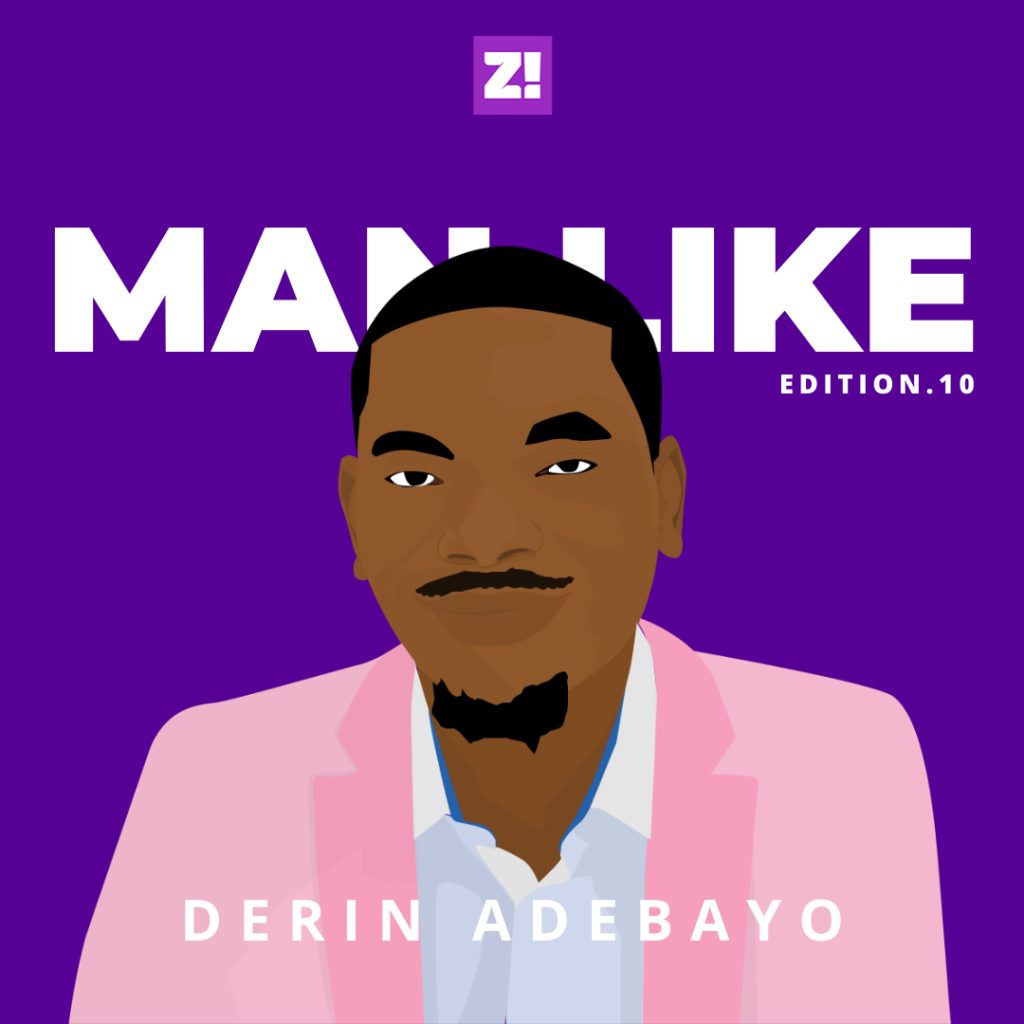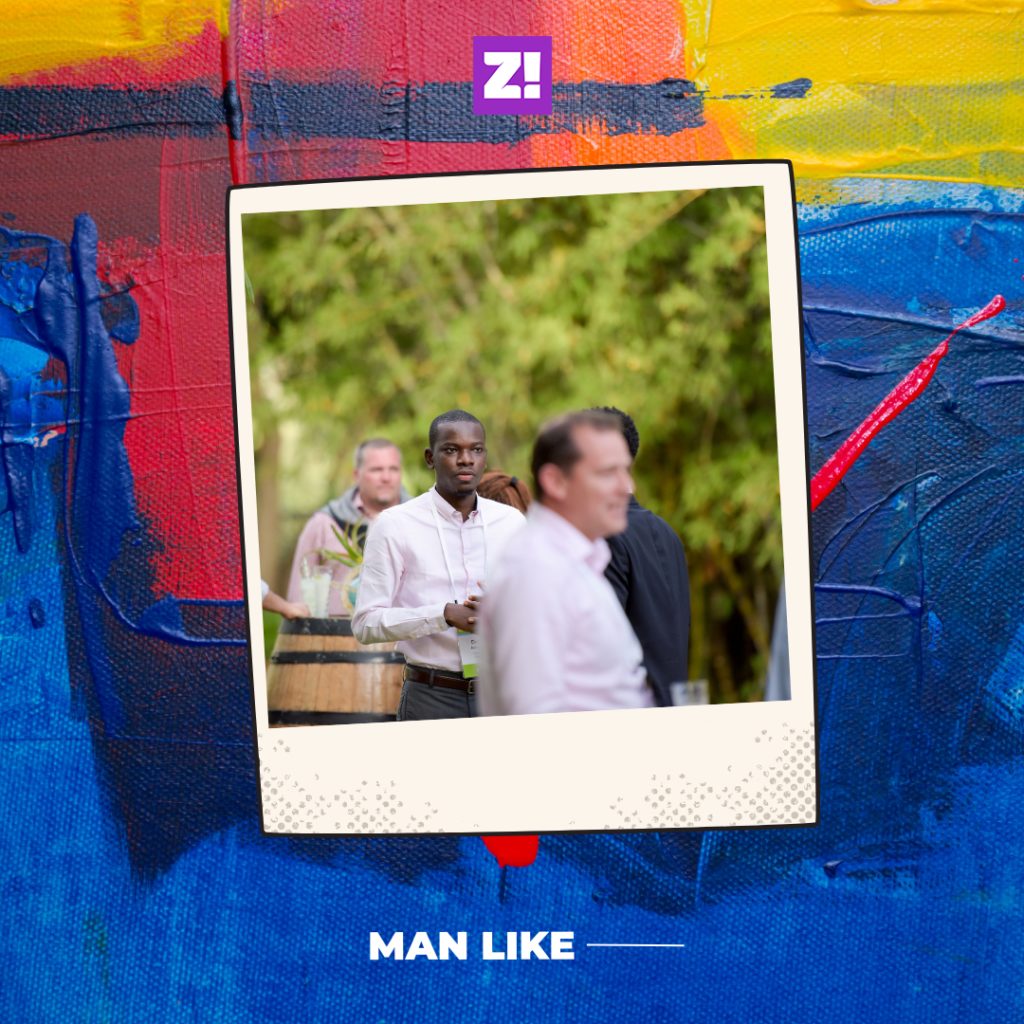What does it mean to be a man? Surely, it’s not one thing. It’s a series of little moments that add up.
“Man Like” is a weekly Zikoko series documenting these moments to see how it adds up. It’s a series for men by men, talking about men’s issues. We try to understand what it means to “be a man” from the perspective of the subject of the week.
The subject for today’s Man Like is Derin Adebayo. He works for a non-profit organization that supports entrepreneurs. He talks about male privilege, the ways he uses his, spirituality, and the ingredients necessary to live a happy life.

Tell me the first time you realised that you were “a man?”
I’m not sure I have.
At least not in the way you mean. From the question, there’s an implied meaning to being a man, things I’d describe as machismo. The only “macho” thing about me growing up was that I enjoyed watching football. However, after joining Twitter and listening to women share their experiences, I was surprised by the difference in the way that men and women experience the world.
So, my idea of what it means to be a man stems from the fact that I experience the world differently from people who don’t identify as men.
Interesting. Can you give an example of this difference?
From listening to and observing women speak openly on Twitter, I’ve realised how much of women’s lives involves keeping themselves safe from men. It wasn’t until I started listening that I knew that women were scared of walking at night. That was a fear I had never experienced.
I’ve been scared in places where the violence or potential for violence was obvious — like being in a dangerous place at night. But for women, any place is a dangerous place. Another thing is hearing women talk about a situation and reflecting on the past where I probably behaved that way [with the most honest of intentions] and realising how I may have made someone feel uncomfortable. And that’s a perspective that you only get from listening directly to women.
I see. What are some adjustments you’ve made?
Number one is just listening to people. Not only women but also people different from me.
A lot of people speak for other people, and what I’ve learnt is to go directly to the source. If someone says poor people do things because of some reason, I’ve learnt to actually speak to a poor person. If someone says homosexuals are this and that, I speak to someone who identifies as one. I let people speak for themselves because when there’s a group that doesn’t necessarily have a voice, a lot of people, some of them well-meaning, take it upon themselves to be the voice of that group.
I’m curious: how does this influence how you define your masculinity?
For me, it’s understanding my privilege in relation to people who aren’t men. Privilege is this weird thing where most people don’t know how to respond when they have it. If you accuse someone of having privilege, they feel guilty. For me, it’s just a thing.
I’m a man. I grew up comfortable, and I’m straight — these are sources of privilege. In other places, I’m not so privileged. I’m black and also Nigerian which is…
I think there are a few ways you can respond to being a man. One is to not even acknowledge your privilege, and I think that’s what the vast majority of men do. The other thing is you can use it to oppress people. Then you can use it to amplify the voices of people who don’t have the privilege. The positive extreme is you can give up the privilege the way Marty Ginsburg did for his wife, Ruth Ginsburg. The way I think of masculinity is that you have this privilege; what are you doing with it?
Has anything ever threatened this idea of masculinity?
Definitely. There are two ways it has been threatened. One is by people who want me to use my privilege in ways I’m not comfortable with. There are women who don’t appreciate men who may want to take a step back. And there are some men who don’t look favourably on men who take a step back. All these don’t bother me because I choose who I interact with and allow into my space.

Second is when I try to use the privilege in a “good” way and fail: Whether it is talking over a woman when trying to amplify her voice or generally failing despite my best intentions. It’s doubly painful hurting someone you’re trying to “help” whether directly or indirectly.
I feel you. Tell me about how this idea of masculinity affects your friendships?
I’m very careful about who I bring into my circle, especially my circle of influence so it doesn’t affect it too much. I have a relatively large group of close friends almost evenly split between men and women. What I find is that the way I experience my friendship with men is different from how I experience it with women.
The dynamic is less about them and more about what parts of myself I see in my friends. The part of me that they bring out. My male friends and I are similar: very ambitious, work in tech, we appreciate a certain kind of searching for knowledge. So they have been influential in helping me drive my career forward in practical ways like making useful connections, collaborating on projects, serving as referees.
My female friends, who are also intelligent and successful in their careers, bring out parts of me that I didn’t know I had. I have a friend who’s comfortable expressing love. She says “I love you.” “I miss you.” Over time, she has made me comfortable expressing love; first to her, then to other friends.
Wonderful! I’m trying to test something: I love you.
No.
Lmao. Does anything scare you?
I get comfortable with things by learning about them. Some things scare people that don’t scare me. The first time I got on a plane, I was comfortable because I had read that flights are safer than road travel. I remember when we were landing in Nigeria, there was no light, so it seemed like we were landing on people’s houses. There was also turbulence. I was like, this is scary, then I looked at the flight attendant and she looked calm, so I was like okay if she’s calm, I’m calm.
But I’m scared just like everyone else that my plans for the future may not work out.
Me too. How do you get comfortable with things you can’t learn about? What I call uncharted territory.
I try to avoid uncharted territory as much as possible. I’m also developing my spirituality to get comfortable with accepting things I don’t understand.
Tell me about this spirituality.
I’m not religious in traditional terms but there’s a huge swathe of existence that I don’t understand. Many things can be explained by science, and then there’s a broader range of things where the science isn’t there and potentially may never be there. For those things, I’m learning to connect with something deeper that allows me to be comfortable with what I don’t understand.

I’m also learning to be comfortable with myself and to connect with other people. Beyond being comfortable with myself, the most central part of my spirituality is understanding that I’m only human in relation to other humans. If you dropped me in the jungle, and I was the only human there, I would automatically become like an animal because of the absence of other humans. So, if being human is dependent on other humans, then one of the most important things a human can do is to connect to others.
I’m jotting things.
It also ties into how I see being a man. I feel like manliness is only in relation to women and femininity. Because if we were all men, then being a man wouldn’t have a meaning. And that shapes how I define my masculinity.
Interesting. Do you have role models? Men you aspire to be like?
Yes.
The caveat is that I don’t necessarily take the whole package because you don’t see the full picture of anyone. There are times where you have romanticised versions of role models, so they disappoint you. I take parts of people. Jeff Bezos’s ability to build a big company and drive towards a goal is something I admire and study. I’m not sure there’s any other part of his life that I find admirable.

Someone like Andrew Alli is someone I admire because he’s aged gracefully. Even though he’s mature, he’s still connected to young people, and young people give you energy. I admire Atedo Peterside because he’s connected to both young and old people, and he’s just in the middle sharing knowledge with both sides. Then, I also admire my dad because he’s really intelligent and also content.
Speaking about your dad and men you admire, what would you say is different about being a man in Nigeria?
I think men in Nigeria are doubly unfortunate. The expectations are twice as much and the ability to fulfil them is half as much. Technically, Nigerian men are four times as unfortunate.
LmaooooI’mcryingohhh. How would you say this affects romantic relationships?
I can’t say for everyone. I’m lucky because my girlfriend pushes me in every way. She’s a good person. She’s always there to help me with career stuff, personal stuff. She’s like the sum of what I like about all the relationships I have with all my friends.
Ahan. No wickedness?
A lot of that too.
Lmao. Stop it. I like it.
Tell me, what are some things you think are necessary to live a happy life?
Family and friends who like you. It’s important to surround yourself with people who actually like you —regardless of your other reasons for entering that friendship.
Also, your work. Your work is separate from a job. Work is more of the long-term impact you want to make on other people’s lives. In addition, a sense of spirituality, not necessarily religion. It’s important to be connected to something greater than you and to allow yourself to experience a sense of wonder and awe towards the world. Because many of those moments are fulfilling in a way that nothing else can be.
Check back every Sunday by 12 pm for new stories in the “Man Like” series. If you’d like to be featured or you know anyone that would be perfect for this, kindly send an email.
COMPONENT NOT FOUND: donation



